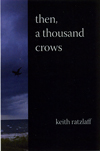Then, a Thousand Crows
Keith Ratzlaff would like some answers. Or perhaps he would like a world that didn’t need so much explaining. This collection of anecdotes and meditations, despite not being dramatically questioning, still seem to present the ghost of “I don’t know why, do you?” From stories of misbehaving, fighting relatives to portraits of paintings in Amsterdam, a current of surprise runs through the plain text and action that reminds us that there are things worth knowing before we pass judgment on our neighbors.
Keith Ratzlaff would like some answers. Or perhaps he would like a world that didn’t need so much explaining. This collection of anecdotes and meditations, despite not being dramatically questioning, still seem to present the ghost of “I don’t know why, do you?” From stories of misbehaving, fighting relatives to portraits of paintings in Amsterdam, a current of surprise runs through the plain text and action that reminds us that there are things worth knowing before we pass judgment on our neighbors.
There are many poems referencing other poets and artists, a manifestation of where many search for truth. However, these poems often stray from anything resembling classic ekphrasis, and often show a more interesting perspective, as in “On a Snowy Morning I Think of Michelangelo”:
But imagine it, the first great snowman
of the High Renaissance. Piero’s giggle,
then his heartbreak as he watched it melt –
which probably wasn’t the point at first
In most of the poems, the description tends to be fairly general; we have very little of the close-up rendering of detail. This is a fairly common method of ‘being bleak’; however, it is worth noting the exception:
She’s sure this is the best photograph
she’s ever taken – the illusion
of floating above her mother
like an airship, cutting her
off at the knees, off at the forehead
the rabbit’s black fur
echoing her mother’s storm of hair,
the animal small, her mother’s hands
large and muscular like the hands
Leonardo and Picasso gave women.
There’s so much energy there, it would have been nice to see more throughout the book. These departures from the overall feel have greater significance for their rarity though, and when we encounter a break from the norm, we get the feeling there’s something genuinely personal or important going on for the author.
As another example: despite most of these poems being told in the first-person, the speaker is a fairly passive observer, recalling actions at most. It gives the illusion of straight narrative, judgments rendered only in the manner of telling. However, in “What Kind of Guy are You?” we finally get the speaker to just come out and tells us why he isn’t donating money to a telephone solicitor for Vietnam Vets, and the effects are wrenching:
I’m the kind of guy who sits so quietly
that yesterday in the park
a squirrel nearly ran up my leg.
I don’t even stand up for the national anthem,
. . .
And I’m the kind of guy who wants to be
like my cat Dudley, how every night
he claims the pillow at my wife’s head –
as he has for fifteen years – sleeping there,
touching her hair, as all my passive,
crippled life I’ve wished I could.
Mixing highlights into the plain style is a real talent, and Ratzlaff’s ear serves him well in this. We get some moments that don’t quite work, where he’s trying too hard, but for the most part, he pulls it off with enough grace that you barely notice anything but the effect. Consider “Almost Ending with a Line from Wang Wei”:
A block from the Christian school
five kids count to three
and yell “fuck” in unison,
the way a choir might
if the choir were Finnish
and yelling “fuck.”
The final section of the book intensifies appeals to the Chinese poets, and of course calls up the stoicism Ratzlaff is advocating in the absence of answers after meandering through the first two parts. It reminds that our shortcomings are not depressing, but just require an enduring search, almost contracting with us that he will maintain it if we will.





